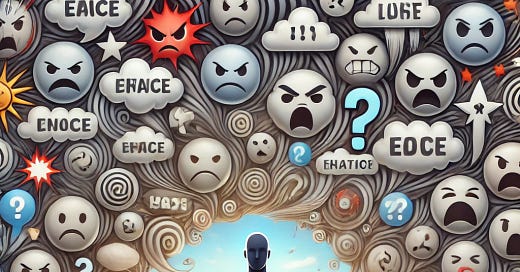TLDR - When someone says something triggering, the real challenge lies in how we respond, not necessarily what was said. If the comment doesn’t cause physical harm or lead to actionable change, it may not warrant a negative reaction.
Expanded
In a world with around 8 billion people, it's impossible to control what others think, feel, or say. Each person has unique experiences, upbringings, and cultural influences that shape their behaviors and comments. So, when someone says something triggering, the question isn’t just about the words spoken but how you react to them.
It’s important to ask yourself: Is what they said physically harmful? If someone’s words are causing immediate physical danger, then action might be necessary to protect yourself or others. However, in most situations, the trigger is not a threat to your safety. In that case, it's worth considering another question: Is their comment giving you a reason to take positive action?
Instead of immediately reacting with negativity, think about whether the situation requires a meaningful response. If there’s no physical danger and no productive action you can take, why waste energy on a negative response? The stress, anger, or frustration will not only fail to change the situation but can also harm your own well-being. Stress responses activate physical processes in the body that can lead to long-term health effects, like increased inflammation, fatigue, and anxiety.
Evaluate Your Reactions:
When you’re triggered by someone's words, pause and go through a quick mental checklist:
Is this a situation that warrants being upset?
Is there a real threat here or something actionable I can do to improve it?
If not, can I choose to let it go?
If the answer to these questions leads you to realize that the issue is not worth your negative energy, it’s a sign that you might need to practice mindfulness. Mindfulness is about focusing on the present moment without judgment, and by practicing this regularly, you can change the way your brain responds to triggers.
Neural pathways strengthen with repeated thoughts, meaning that if you continually respond to situations with negativity, your mind becomes trained to see more negativity in the future. But if you begin to focus on positivity and let go of stressors that aren’t worth your energy, your brain can start to shift toward a more positive outlook over time.
The Power of Positivity:
Why not choose a positive perspective on situations that aren’t causing you physical harm or requiring immediate action? By doing this, you protect your mental and physical health. When you focus on the positives, you're not just avoiding stress—you’re actively training your brain to be more resilient and less reactive in the future.
In conclusion, the next time you find yourself triggered by someone's words, take a moment to evaluate whether it’s really worth a negative reaction. If it’s not, let that be your cue to practice mindfulness and let it go. Remember, you have the power to control how you respond, and that can make all the difference in maintaining your well-being.
Reflecting Thoughts
Do you hate the things your coworker says? Perhaps there’s a coworker who constantly makes comments that irritate you. Ask yourself: Are these comments causing you direct harm, or are they just bothersome? Is there any action you can take to improve the situation? If not, why let these remarks impact your day? Consider reframing them in your mind. What if you viewed them as silly or even comical, rather than irritating? By not giving these comments power over your mood, you protect your peace of mind. There’s no benefit in letting this person influence your daily thoughts with negativity.
Does a specific politician trigger your anger? Political discourse can be overwhelming, especially when a politician’s words or actions upset you. If you already know how you're going to vote, is there any additional action to take? What's the value of constantly following updates about their statements? If you're unlikely to change your mind or take further action, ask yourself: How is this information improving my life? Instead of dwelling on political news that brings frustration, consider limiting your exposure to it. More than likely, continuing to engage in content that triggers you will not change your choices, so it may not be worth your energy.
Did you overhear someone making a comment you didn’t agree with? Imagine hearing a stranger or acquaintance make a comment that goes against your beliefs. You might find yourself replaying the conversation, thinking of all the things you could have said in response. But the moment has passed, and unless the comment caused physical harm or prompted action, there’s little to gain from dwelling on it. Is it worth continuing to think negatively about this interaction? Holding onto these thoughts only breeds unnecessary tension, when instead, you could let them go and refocus on something positive.
Is social media causing you stress? Have you ever found yourself getting upset by someone’s post on social media—maybe a friend shared an opinion you strongly disagree with, or someone’s comment hit a nerve? Ask yourself: Is this post causing you physical harm or requiring an actionable response? If not, why give it more attention than it deserves? Social media often amplifies negativity, so being selective about what you engage with can help you avoid unnecessary stress.
Do you let daily inconveniences ruin your mood? Think about those small, annoying situations—like someone cutting you off in traffic or a delayed delivery. While frustrating, these moments are temporary and typically don’t cause lasting harm. Yet, how often do we allow them to dominate our thoughts and mood for hours? Instead of letting these minor inconveniences dictate your emotions, ask yourself: Is this worth the stress I’m feeling? Most likely, the answer is no. Try shifting your focus away from the inconvenience and toward something positive in your day.



